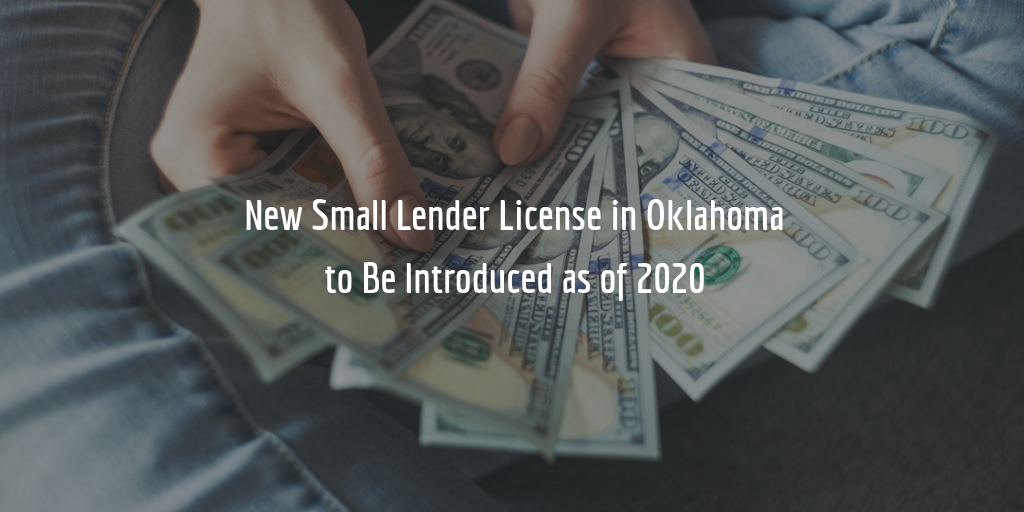Oklahoma Introduces New Licensing & Bonding Regulations for Small Loan Lenders

The state of Oklahoma enacted the Small Lenders Act on April 18, 2019. Signed by Governor Kevin Stitt, the Act introduces a licensing requirement for small lenders in the state, beginning January 1, 2020. Among other things, applicants for such a license will need to post a small loan company surety bond during the application process.
The Act also defines what a small loan is and specifies the conditions under which a small lender may operate, and the obligations and responsibilities they must comply with.
Keep reading for a brief overview of the Act, and the licensing requirements!
Oklahoma Small Lenders Act
The Small Lenders Act (SLA) will come into effect on January 1, 2020. After that date, anyone currently licensed under the Deferred Deposit Lending Act who wishes to obtain a small lender license under the new Act will be able to do so by applying at the Department of Consumer Credit (DOCC).
Yet, under the SLA no small loans can be made in Oklahoma until August 1, 2020. On this date, the new Act will come into effect whereas the Deferred Deposit Lending Act and any licenses issued under it will be terminated. No new deferred deposit loans (DDL) may be entered into or transacted by a DDL licensee after August 1. DDL licensees can, however, continue servicing and collecting any loans they have made before August 1, until they are paid in full.
The SLA defines a small loan as made under a written agreement under which the licensed lender “contemplates credit transactions from time to time that”:
- Are unsecured,
- Do not have a term longer than 12 months or less than 60 days,
- Are fully amortized and can be paid in substantially equal periodic payments, and
- Can be prepaid in whole or in part at any time without penalty
The SLA also introduces specific licensing requirements for future applicants for this type of license. These are as follows.
Licensing requirements for Oklahoma small lenders
To get licensed as a small lender, applicants will need to comply with the following requirements:
- Demonstrate net worth of at least $50,000 for each location
- Provide an audited financial statement that includes a balance sheet, an income statement, and a statement of changes in financial position for the previous fiscal year, prepared in accordance with Generally Accepted Accounting Principles (GAAP) by a certified public accountant (CPA); for new businesses a business statement may be deemed sufficient by the DOCC
- Obtain a surety bond in an amount of $25,000 for every location of the business, with the aggregate bonding limit for an individual licensee not being more than $200,000
- Authorize a criminal background record check for directors, officers, and anyone who holds shares of 10% or more (if requested to do so by the DOCC Administrator)
- Pay a $700 filing fee, a $500 license fee, and a $700 supervision fee
Upon posting an application to the DOCC, the latter will review it and if it deems the application sufficient, it will issue a small lender license to the applicant.
Of course, the SLA also clearly specifies how small lenders can and must conduct business. This includes details about interest rates, aggregate principal limits, requirements for database use, ability-to-repay requirements, and more. Applicants for this type of license must make sure to carefully study their obligations and responsibilities under the Act in order to remain compliant.
Oklahoma small lender surety bond requirement
Under the SLA, applicants for the small lender license in the state must post a $25,000 surety bond per location, with a maximum of $200,000 for all locations. The bond must remain valid for at least 3 years after the expiration, surrender or revocation of a lender’s license.
The bond is put into place to provide protection to small lenders’ clients in cases of fraud, misrepresentation, breach of contract, violation of the SLA, and various other actions on behalf of the lender. Under the SLA, anyone harmed by a lender in these ways can bring a claim directly against the lender’s bond.
Small lender bond cost
The cost of the bond is equal to a fraction of the total amount of the required bond. Typically, sureties review an applicant’s personal credit score (and certain other financial indicators) to determine the rate at which they can bond the applicant.
The higher an applicant’s score, the lower the bond rate they are offered. Applicants with a high credit score can expect to be offered a rate between 1% and 3% of the total amount of their bond. If you would like to get a free and аccurate quote on your bond, simply complete our bond application form and we will get in touch with you shortly!




